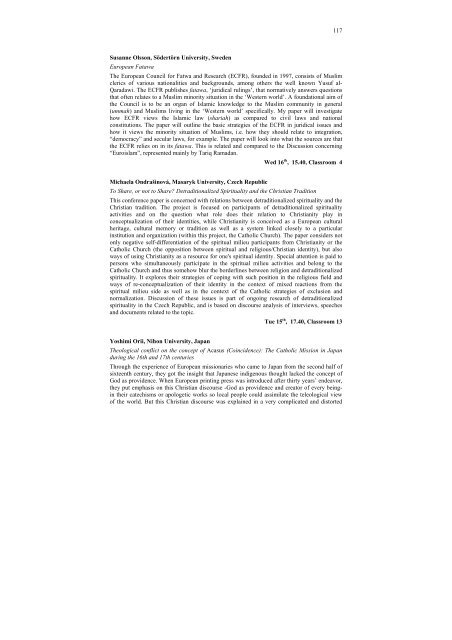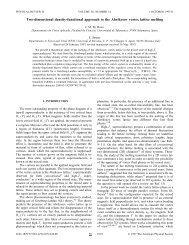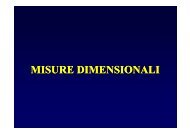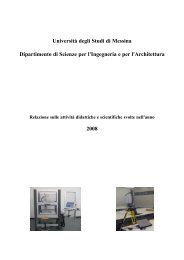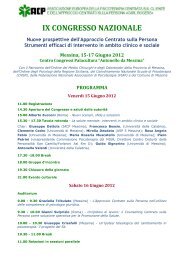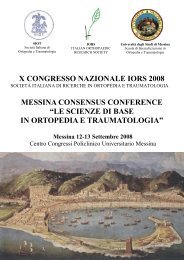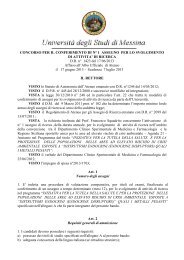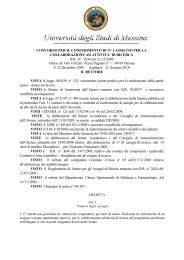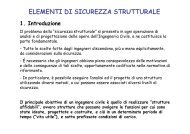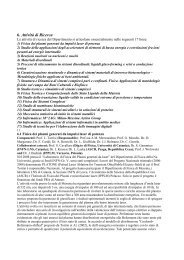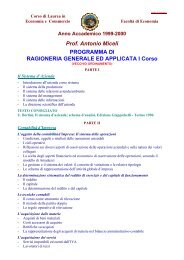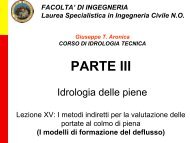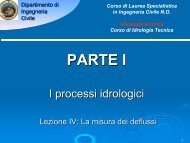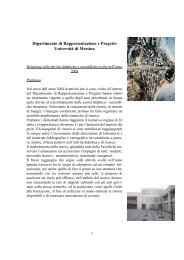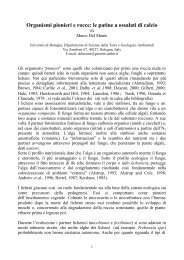PROGRAMME AND ABSTRACTS - Università degli Studi di Messina
PROGRAMME AND ABSTRACTS - Università degli Studi di Messina
PROGRAMME AND ABSTRACTS - Università degli Studi di Messina
Create successful ePaper yourself
Turn your PDF publications into a flip-book with our unique Google optimized e-Paper software.
Susanne Olsson, Södertörn University, Sweden<br />
European Fatawa<br />
117<br />
The European Council for Fatwa and Research (ECFR), founded in 1997, consists of Muslim<br />
clerics of various nationalities and backgrounds, among others the well known Yusuf al-<br />
Qaradawi. The ECFR publishes fatawa, ‘juri<strong>di</strong>cal rulings’, that normatively answers questions<br />
that often relates to a Muslim minority situation in the ‘Western world’. A foundational aim of<br />
the Council is to be an organ of Islamic knowledge to the Muslim community in general<br />
(ummah) and Muslims living in the ‘Western world’ specifically. My paper will investigate<br />
how ECFR views the Islamic law (shariah) as compared to civil laws and national<br />
constitutions. The paper will outline the basic strategies of the ECFR in juri<strong>di</strong>cal issues and<br />
how it views the minority situation of Muslims, i.e. how they should relate to integration,<br />
“democracy” and secular laws, for example. The paper will look into what the sources are that<br />
the ECFR relies on in its fatawa. This is related and compared to the Discussion concerning<br />
“Euroislam”, represented mainly by Tariq Ramadan.<br />
Michaela Ondrašinová, Masaryk University, Czech Republic<br />
Wed 16 th , 15.40, Classroom 4<br />
To Share, or not to Share? Detra<strong>di</strong>tionalized Spirituality and the Christian Tra<strong>di</strong>tion<br />
This conference paper is concerned with relations between detra<strong>di</strong>tionalized spirituality and the<br />
Christian tra<strong>di</strong>tion. The project is focused on participants of detra<strong>di</strong>tionalized spirituality<br />
activities and on the question what role does their relation to Christianity play in<br />
conceptualization of their identities, while Christianity is conceived as a European cultural<br />
heritage, cultural memory or tra<strong>di</strong>tion as well as a system linked closely to a particular<br />
institution and organization (within this project, the Catholic Church). The paper considers not<br />
only negative self-<strong>di</strong>fferentiation of the spiritual milieu participants from Christianity or the<br />
Catholic Church (the opposition between spiritual and religious/Christian identity), but also<br />
ways of using Christianity as a resource for one's spiritual identity. Special attention is paid to<br />
persons who simultaneously participate in the spiritual milieu activities and belong to the<br />
Catholic Church and thus somehow blur the borderlines between religion and detra<strong>di</strong>tionalized<br />
spirituality. It explores their strategies of coping with such position in the religious field and<br />
ways of re-conceptualization of their identity in the context of mixed reactions from the<br />
spiritual milieu side as well as in the context of the Catholic strategies of exclusion and<br />
normalization. Discussion of these issues is part of ongoing research of detra<strong>di</strong>tionalized<br />
spirituality in the Czech Republic, and is based on <strong>di</strong>scourse analysis of interviews, speeches<br />
and documents related to the topic.<br />
Yoshimi Orii, Nihon University, Japan<br />
Tue 15 th , 17.40, Classroom 13<br />
Theological conflict on the concept of Acasus (Coincidence): The Catholic Mission in Japan<br />
during the 16th and 17th centuries<br />
Through the experience of European missionaries who came to Japan from the second half of<br />
sixteenth century, they got the insight that Japanese in<strong>di</strong>genous thought lacked the concept of<br />
God as providence. When European printing press was introduced after thirty years’ endeavor,<br />
they put emphasis on this Christian <strong>di</strong>scourse -God as providence and creator of every being-<br />
in their catechisms or apologetic works so local people could assimilate the teleological view<br />
of the world. But this Christian <strong>di</strong>scourse was explained in a very complicated and <strong>di</strong>storted


